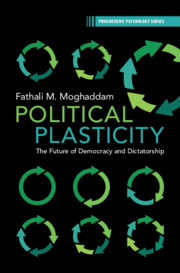Book contents
- Political Plasticity
- The Progressive Psychology Book Series
- Political Plasticity
- Copyright page
- Dedication
- Contents
- Figures
- Preface
- Acknowledgments
- Chapter 1 Political Plasticity, the Key to Understanding the Future of Democracy and Dictatorship
- Chapter 2 Hardwiring inside and outside People
- Part I Political Plasticity and Behavioral Continuity
- Chapter 3 Why Do Leaders Still Exist? Leadership and Followership
- Chapter 4 Rich and Poor – Still Just as Different
- Chapter 5 Ethnicity Is Forever
- Chapter 6 Religion, Eternally Present but with a Thousand Faces
- Chapter 7 The Built Environment and Behavioral Continuity
- Part II Change Agents, in Theory and Practice
- Part III Looking Ahead
- Notes
- References
- Index
Chapter 6 - Religion, Eternally Present but with a Thousand Faces
from Part I - Political Plasticity and Behavioral Continuity
Published online by Cambridge University Press: 15 January 2023
- Political Plasticity
- The Progressive Psychology Book Series
- Political Plasticity
- Copyright page
- Dedication
- Contents
- Figures
- Preface
- Acknowledgments
- Chapter 1 Political Plasticity, the Key to Understanding the Future of Democracy and Dictatorship
- Chapter 2 Hardwiring inside and outside People
- Part I Political Plasticity and Behavioral Continuity
- Chapter 3 Why Do Leaders Still Exist? Leadership and Followership
- Chapter 4 Rich and Poor – Still Just as Different
- Chapter 5 Ethnicity Is Forever
- Chapter 6 Religion, Eternally Present but with a Thousand Faces
- Chapter 7 The Built Environment and Behavioral Continuity
- Part II Change Agents, in Theory and Practice
- Part III Looking Ahead
- Notes
- References
- Index
Summary
Modernization theory leads us to expect that religion will decline and disappear, as science and education advance and fact based explanations replace religious faith based explanations. But the expected trend of religious decline and disappearance has not come about, even when revolutions bring communist regimes to power and the official government position becomes atheist and antireligious. In discussing explanations for the continued centrality of religion in major societies, first the evolutionary roots of religion are considered in this chapter. One group of researchers believe that religion evolved as an adaptation, a behavior that confers advantages on an organism or species to become more successful in its environment. A competing explanation is that religion is a byproduct of human cognitive architecture. Also discussed are explanations of religion that focus on collective processes, such as Marxs idea of religion serving as the opium of the people, helping them to cope with the pains of everyday life. A similar idea underlies Terror Management Theory, which describes religion as a mechanism for people to cope with the knowledge that they are going to die. The continuity of religion is also associated with continuity in other domains of behavior.
Keywords
- Type
- Chapter
- Information
- Political PlasticityThe Future of Democracy and Dictatorship, pp. 61 - 71Publisher: Cambridge University PressPrint publication year: 2023

